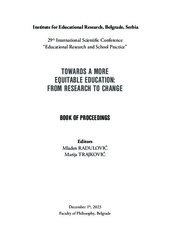Приказ основних података о документу
Teachers’ perspectives on challenges in inclusive education – a research overview
| dc.contributor | Radulović, Mladen | |
| dc.creator | Đević, Rajka | |
| dc.creator | Malinić, Dušica | |
| dc.creator | Vujačić, Milja | |
| dc.date.accessioned | 2023-11-28T23:33:38Z | |
| dc.date.available | 2023-11-28T23:33:38Z | |
| dc.date.issued | 2023 | |
| dc.identifier.isbn | 978-86-7447-165-4 | |
| dc.identifier.uri | http://ipir.ipisr.org.rs/handle/123456789/1015 | |
| dc.description.abstract | n 2009, the adoption of the Law on the Fundamentals of the Education System in Serbia established a legal framework for the implementation of inclusive education. Thus, conditions were met for ensuring educational equity and access for all children, including children with developmental disabilities. This legal framework provided a starting point for the practical implementation of inclusive education in which different actors, teachers in particular, face numerous challenges and adopt new roles. Generally, research has shown that during the implementation of inclusive education, teachers face various difficulties that greatly affect their overall attitude towards the process and their success in performing the new roles they are expected to fulfill (Shen et al., 2015). Some of the key problems researchers have highlighted include teachers’ insufficient or inadequate preparation for teaching in inclusive settings (Weiss et al., 2018), along with a lack of adequate support at the school and education system levels (Kupper et al., 2020; as cited in Leijen et al., 2021). Teachers tend to struggle with the incongruity between what is expected of them in an inclusive setting and their pre-established understanding of the educational process based on the traditional pedagogical paradigm. Since teachers do not feel sufficiently competent and prepared to adopt a differentiated approach to teaching, what emerges as their greatest concern is how to simultaneously organize joint learning activities for all students in a class (McTighe & Brown, 2005). Insufficient teacher training and a lack of adequate support negatively affect teachers’ motivation and lead to various forms of resistance and negative attitudes towards the implementation of inclusive education (Shen et al., 2015). | sr |
| dc.language.iso | en | sr |
| dc.publisher | Belgrade : Institute for Educational Research | sr |
| dc.relation | info:eu-repo/grantAgreement/MESTD/inst-2020/200018/RS// | sr |
| dc.rights | openAccess | sr |
| dc.rights.uri | https://creativecommons.org/licenses/by-nc-nd/4.0/ | |
| dc.source | Towards a More Equitable Education: From Research to Change | sr |
| dc.title | Teachers’ perspectives on challenges in inclusive education – a research overview | sr |
| dc.type | conferenceObject | sr |
| dc.rights.license | BY-NC-ND | sr |
| dc.citation.epage | 29 | |
| dc.citation.issue | 23 | |
| dc.description.other | Book of Proceedings: The 29th International Scientific Conference “Educational Research and School Practice“ Towards a More Equitable Education: From Research to Change,1. December, 2023 ISBN: 978-86-7447-165 | sr |
| dc.identifier.fulltext | http://ipir.ipisr.org.rs/bitstream/id/3136/bitstream_3136.pdf | |
| dc.identifier.rcub | https://hdl.handle.net/21.15107/rcub_ipir_1015 | |
| dc.type.version | publishedVersion | sr |

